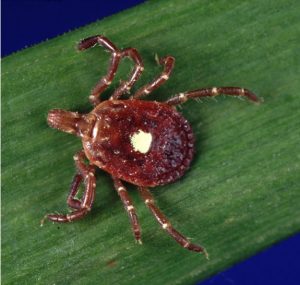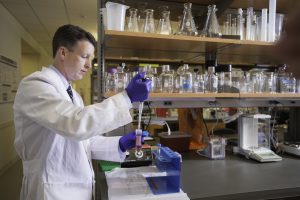By Katie Nash, UNC Health Foundation
For millions across the nation, summer means sunshine, cookouts and outdoor activities (from a safe distance, of course). However, increased time spent outdoors means potential exposure to bites from harmful insects such as ticks. In the Southeast in particular, one species of tick is contributing to a steady rise in cases of a bizarre allergy.
Alpha-gal is a sugar molecule found in non-human mammals such as cows, pigs and sheep. Most humans are able to consume red meat from these animals without issue, but over the last decade researchers have documented an exponential increase in new allergies to red meat, specifically to the alpha-gal sugar in the products. At the forefront of research into this development is UNC Health’s Scott Commins, MD, PhD.

Patients develop an allergic antibody to alpha-gal after suffering a bite from the lone star tick, a common breed in North Carolina and the Southeast that is also spreading nationwide. These patients suffer various symptoms of anaphylaxis such as hives, respiratory distress and gastrointestinal trouble.
The allergy is most commonly triggered by red meat consumption, but in some cases can be caused by other animal-derived food products such as dairy, gelatin and even non-food animal products such as valves for heart patients and anticoagulant medications. Compounding the issue is alpha-gal’s delayed onset of symptoms.
“We hear a lot of interesting stories because this is not an allergy where you eat a hamburger and have hives within minutes – it frequently takes three to six hours for patients to develop symptoms,” Dr. Commins said.
Given this delay, it can often be difficult for patients with undiagnosed alpha-gal allergies to make the association between their symptoms and what they have eaten. Combined with a lack of public awareness, it can be a challenging condition to diagnose.
“People naturally associate their reactions with their surroundings at the time of onset,” Dr. Commins said. “It’s easy for reactions to be disguised as an environmental trigger.”
There is currently no approved treatment or cure. Antihistamines may help manage allergic reactions after onset, but they are not effective as a preventative measure.
From ‘Strange Observation’ To Life’s Work
Early in his training, Commins was the first author on one of the seminal scientific papers studying alpha-gal. He is now one of the leading experts worldwide on the subject. The study had a sample size of two dozen people, and Dr. Commins and his team thought the condition of a delayed food allergy was a fascinating anomaly in a small group of people.
They had no idea that it was just the tip of the iceberg. Within two years, the team followed the study with another that had over 200 patients.
“These were adults coming in with an allergy to beef, pork or lamb with symptoms that took hours to manifest, but they had previously eaten it safely their entire lives,” Dr. Commins said. “It really flew in the face of the traditional food allergy paradigm where these episodes start very early in life without a period of tolerance and with quickly developing symptoms.”
Now, a decade later and working with the Centers for Disease Control and Prevention to map the condition more thoroughly, Dr. Commins and his team have reported over 34,000 cases of the alpha-gal allergy in the U.S. alone.
“It has become the focus of my career now – it didn’t start out that way,” Dr. Commins said. “And it all started with this strange observation in a small group of people,”

In his lab, Dr. Commins and his team are on the cutting edge of alpha-gal research. Using a mouse model to replicate the allergy and collaborating with scientists who provide biological samples from ticks, the team is poised to discover what specifically about tick bites causes the intolerance to develop.
Another development in collaboration with the North Carolina Department of Agriculture seeks to bring alpha-gal-free pigs to the mainstream market. With the alpha-gal protein “edited” out of their DNA, the pigs could provide a safe source of heart valves, heparin and other medical grade supplies as well as potentially serving as a safe source of food products such as gelatin and pork.
“These pigs exist in the research environment, but we want to bring this to the consumer-facing medical and food market,” Dr. Commins said. “It’s a development that we’re excited about and think could happen quickly, but we rely on funding to make it happen.”
Dr. Commins also has several studies with human patients enrolled from his clinic. His team is working to isolate allergy cells in blood samples in hopes of learning how to “turn off” the cells through targeted therapies such as shots. Donations have allowed the research team to purchase advanced technology to make deeper dives than ever into allergic responses from patients, and Dr. Commins looks forward to publishing the results in the near future.
Shining A Light
Dr. Commins says his patients are eager to participate in these studies and help take alpha-gal research to the next level. One patient in particular has taken on a personal mission of raising awareness of the condition.
“I was floored at just how little information was available,” said Sharon Forsyth, a Washington, D.C., native who was diagnosed with alpha-gal allergy in 2019 and began seeing Dr. Commins in October. “My primary care provider had never even heard of it and we were both eager to learn, but there were practically no resources.”

Forsyth and her husband, who also suffers from the condition and is a patient of Dr. Commins, had to give up both red meat and dairy due to their allergy. She was alarmed by the lack of awareness of alpha-gal both among the public and healthcare providers – even allergy specialists.
“One allergist I went to early on suggested that my symptoms were due to colon cancer,” Forsyth said. “And you wouldn’t believe the number of people I’ve met and told about alpha-gal since my diagnosis who have said, ‘Wow, I think I might have that’ and then gotten tested and were positive. The number of people suffering through this while unaware of the root cause is staggering – it’s estimated that one to three percent of people in much of the Southeast have this allergy.”
Since her diagnosis, Forsyth has become a leader in advocacy for the allergy. She has worked with a group of over 50 other people with alpha-gal syndrome to establish alphagalinformation.org, a central location for alpha-gal knowledge built on the contributions and collaborations of healthcare providers and patients across the nation. She credits Dr. Commins as a huge partner in this step to bring alpha-gal into the mainstream.
“If it wasn’t for him, none of this would be possible and I would not be able to do the advocacy work that I do,” Forsyth said. “There are so few people doing any alpha-gal research – much less doing the research, seeing patients and getting the word out, particularly about the full range of symptoms. He is such an important person to the tens of thousands of people who have been diagnosed and the potential millions who haven’t yet been diagnosed.”
Shifting The Paradigm Through Giving
Forsyth knows just how critical private donations are for researchers like Dr. Commins to make meaningful progress.
“The money available for research and treatment is just not enough with the vast number of people who need help,” Forsyth said. “Philanthropy is truly the seed for everything new and exciting that happens – so little is known about alpha-gal and it’s so different from other allergies, which makes private sources of funding all the more important. Being a cross between a tick-borne disease and an allergy, Dr. Commins has to really fight to make sure that it falls into a category where it will get grant funding. It’s a paradigm-shifting condition that involves a lot of work.”
Dr. Commins stresses that these donations offer the chance to move this research to a cure much faster.
“We have some support for our basic science, but to move a therapy through a clinical trial takes a lot of resources. I’m so grateful for our donors who enable us to have the flexibility to pick the therapies that we think will be the most effective and trying to bring that to a clinical trial and ultimately to patients.” Dr. Commins said.
“I hear so many stories from patients who have suffered for so long with this condition. They are so grateful for our efforts and generous with their time and gifts – that is what keeps me inspired and motivated.”
To make a gift supporting Dr. Commins’ work, click here.
For more information, please contact Mary Margaret Carroll at mary_carroll@med.unc.edu.

3 Responses to “Uncovering a Hidden Allergy”
Carroll Lassiter
This is a life changing allergy . I tested positive for alpha-gal five years ago. Mammal meat and dairy are off the table.
In the last year,I’ve experienced four recurrent bouts of abdominal pain and wonder if there is any association with alpha-gal.
I would like to make a donation for research and am willing to participate in studies.
Doreen J Marlowe
I am a patient of Dr Commins. He continues to help me through this journey.
Kristy cantrell
I was recently diagnosed with alpha gal and it’s been alot of trial and error for me. Not only can I not eat mammalian meat, or any type of dairy…but I have had to use all vegan cosmetics, shampoos, soaps, lotions ,etc. I only eat foods that come from a seed..and it’s better that way. At least for me. I felt like I was on my death bed for months. I went to several doctors and I was told everything from needing a hysterectomy to it being an allergy of some sort, but they didn’t know what..they give me steroids and sent me on my way. Lol!! But now that I know, and I completely avoid meat, I feel a thousand times better, my hair is no longer falling out, and my energy level is of a 20 yr old. I think this was God’s way of getting me healthy. I can’t be mad about it. It’s completely changed my life though.lol